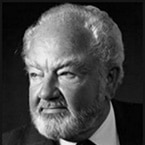
Irving S. Johnson, PhD, emeritus member of the AACR, died July 10, 2014, at the age of 89. Johnson, who was known for his research on recombinant DNA, was an AACR member for 55 years.
Born June 30, 1925, in Grand Junction, Colorado, Johnson was a veteran U.S. Navy officer who served on aircraft carriers in the South Pacific during World War II. He received his doctoral degree in developmental biology from the University of Kansas in Lawrence, in 1953, and began his career as a leading scientist in the pharmaceutical industry at Eli Lilly and Company, where he eventually served as vice president of research. After retiring from this position in 1988, Johnson worked as an independent biomedical research consultant for the next 20 years.
Johnson’s work using recombinant DNA led to the commercial production of human insulin. Johnson also helped discover a new class of cancer-fighting drugs for treating childhood leukemia and had worked with Jonas Salk, assisting with production of the first batch of polio vaccine for clinical trials.
Johnson had been a member of the AACR since 1959, serving as an associate editor of Cancer Research and establishing the G.H.A. Clowes Memorial Award. In 1986, the AACR honored Johnson with the Fifth Cain Memorial Award in recognition of his outstanding preclinical research in cancer therapy.
Johnson was a consultant to the National Cancer Institute’s Therapeutic Development Committee when President Richard Nixon declared the war on cancer. He was also appointed to the National Institutes of Health’s Recombinant Advisory Committee and the U.S. delegation of the National Science Foundation that reviewed the biological effects of the atomic bombs dropped on Hiroshima and Nagasaki, Japan. Additionally, Johnson was a fellow of the American Association for the Advancement of Science and the first recipient of the Annual Congressional Award in Science and Technology. He endowed a professorship named in his honor at the University of Kansas to support postdoctoral and graduate students in the hope of furthering biomedical research.
Be the first to add a Remembrance.